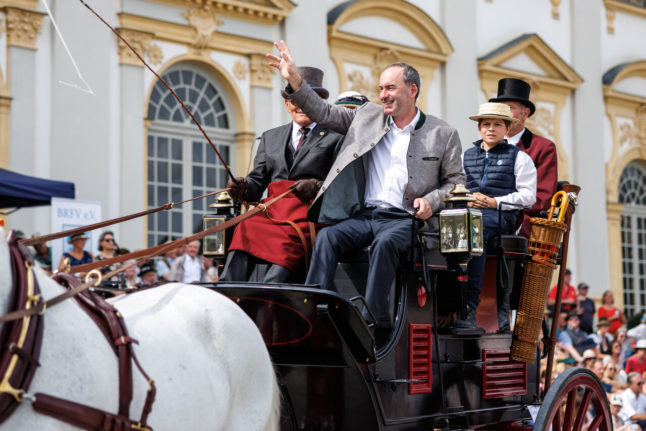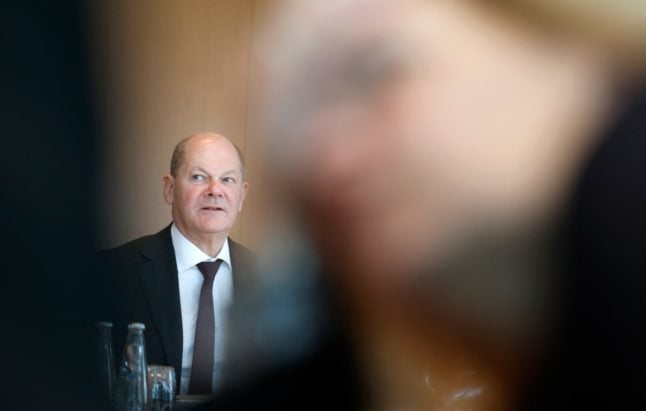Bavaria’s conservative prime minister Markus Soeder said it would “not be proportionate” to sack Hubert Aiwanger — a move that would have upended the southern state’s ruling coalition.
Aiwanger has faced days of controversy over Nazi pamphlets found in his schoolbag as a teenager in the late 1980s.
The now 52-year-old is Bavaria’s deputy premier and leader of the populist Free Voters party, the junior coalition partner to Soeder’s conservative Christian Social Union (CSU).
Aiwanger has admitted being in possession of the leaflets but denies producing or distributing them. His brother has since claimed to be the author.
READ ALSO: German state leader demands answers on anti-Semitic flyer
The document proposed a satirical quiz on “the biggest fatherland traitor” and offered as a prize “a free trip through the chimney in Auschwitz”.
Aiwanger, who is also Bavaria’s economy minister, on Thursday said he had made mistakes in his youth and apologised for any hurt caused, especially to victims of Nazi-era atrocities.
Speaking at a Munich press conference, Soeder said although the leaflet was “disgusting” there was no evidence Aiwanger had written it. Aiwanger had also expressed regret for what happened 35 years ago, he stressed.
“It’s not just what you say at 16 that matters, but also how you deal with it as a 52-year-old,” Soeder said. “And if you show true remorse, it’s easier to hope for forgiveness.”
But Soeder stopped short of giving Aiwanger a free pass, notably criticising his deputy for not apologising sooner. He also said Aiwanger’s written answers to a list of 25 questions “were not all satisfactory”.
‘Witch hunt’
Soeder said the events of the past week had “damaged Bavaria” and that Aiwanger would have to work to “win back lost trust” — including by seeking out dialogue with Jewish communities.
The flyer revelations sparked widespread outrage in Germany, a country still atoning for the slaughter of six million European Jews in the Holocaust.
Former classmates also made further allegations in recent days, including accusing Aiwanger of telling Nazi jokes and giving the Hitler salute. Aiwanger either denied the claims or said he could not recall the events.
READ ALSO: Why a high profile Bavarian politician is embroiled in an anti-Semitic row
Aiwanger, who has described himself as the victim of a “witch hunt”, said Soeder’s decision showed that “the campaign against me has failed”.
“What I said from the beginning has now been confirmed: there is no reason to dismiss me,” Aiwanger told Bild newspaper.
“We must now return to the day-to-day work for our state, so that Bavaria can continue to be governed in a stable and sensible manner from the autumn onwards.”
‘Bad for Germany’
Keeping Aiwanger in office allows Soeder to keep his coalition government intact ahead of an October 8 regional election, for which postal voting has already begun.
Soeder is hoping for re-election and wants to continue governing with the right-wing Free Voters.
Latest opinion polls put support for Soeder’s popular CSU at 39 percent, with the Free Voters at around 12 percent.
Soeder on Sunday again ruled out ditching the Free Voters, saying his CSU “definitely” won’t team up with the leftist Greens who are polling at around 14 percent.
German Interior Minister Nancy Faeser, from Chancellor Olaf Scholz’s Social Democrats, slammed Soeder’s handling of the affair.
The Bavarian premier had “made a simple power calculation” and in doing so had “damaged our country’s reputation”, she told the RND media group.
Aiwanger had “neither apologised convincingly nor been able to dispel the accusations convincingly,” she added.
Green party co-leader Omid Nouripour accused Soeder of putting political tactics above a proper reckoning with the past.
“That’s indecent and bad for Bavaria, as well as bad for Germany,” he told Spiegel magazine.



 Please whitelist us to continue reading.
Please whitelist us to continue reading.
Member comments